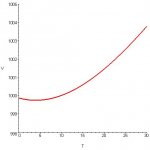cv2yanks13
New member
- Joined
- Mar 17, 2010
- Messages
- 13
Where in Interval does it Reach Absolute Maximum Value
The volume V (in cubic centimeters) of 1 kg of water is very closely approximated by the function
v= 999.87 - (0.06426)T + (0.0085043) T^2 - (0.0000679)T^3
for temperatures ranging from 0 degrees Celsius to 30 degrees Celsius. At what temp on this interval does the volume reach its absolute maximum value?
I understand how to get the absolute max values from looking at the graph... but I need to show ALL algebraic and calculus work... I believe I need to find this by finding what the critical points are... I'm a little confused on how to find that (I'm uncertain if I have the correct answer)... can someone please assist me with this problem?? I truly need someone's help
What I need help with is factoring out this equation to find the critical points... I'm lost... please help me out... I need a good homework grade...
The volume V (in cubic centimeters) of 1 kg of water is very closely approximated by the function
v= 999.87 - (0.06426)T + (0.0085043) T^2 - (0.0000679)T^3
for temperatures ranging from 0 degrees Celsius to 30 degrees Celsius. At what temp on this interval does the volume reach its absolute maximum value?
I understand how to get the absolute max values from looking at the graph... but I need to show ALL algebraic and calculus work... I believe I need to find this by finding what the critical points are... I'm a little confused on how to find that (I'm uncertain if I have the correct answer)... can someone please assist me with this problem?? I truly need someone's help
What I need help with is factoring out this equation to find the critical points... I'm lost... please help me out... I need a good homework grade...

